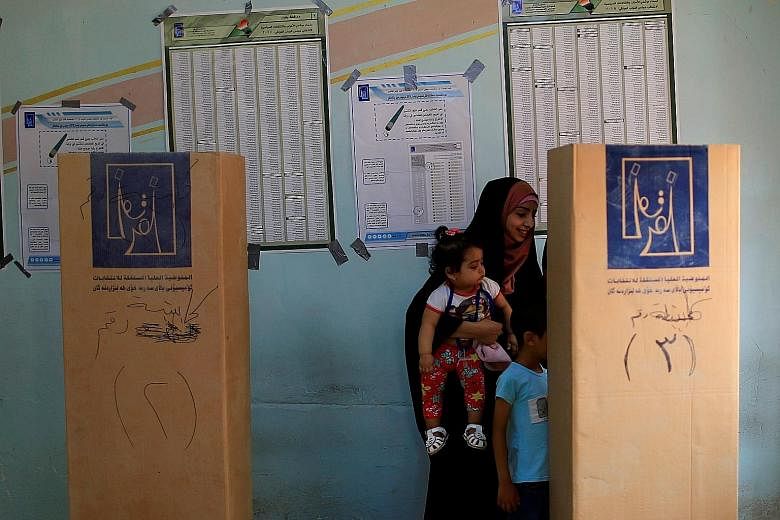BAGHDAD/MOSUL • Iraqis said they had scant hope their new leaders would stabilise a country beset by conflicts, economic hardship and corruption, as Iraq yesterday held its first parliamentary election since the Islamic State in Iraq and Syria (ISIS) was defeated last December.
Depending on the outcome, the polls could bolster Iran's role in Iraq and the Middle East.
Aside from geopolitics that has deepened sectarian divisions, Iraq faces challenges after a three-year war against ISIS which cost the country about US$100 billion (S$133.6 billion).
Much of the biggest northern city of Mosul has been reduced to rubble. Security is still threatened by sectarian violence, which erupted into a civil war at the height of a 2003-2011 American occupation that followed the fall of Iraqi dictator Saddam Hussein.
The vote's victor will have to contend with fallout from US President Donald Trump's decision to pull out of a nuclear deal with Iran, a move Iraqis fear could turn their country into a theatre of conflict between Washington and Teheran.
The three main ethnic and religious groups - the majority Shi'ite Arabs, minority Sunni Arabs and Kurds - have been at odds for decades, and sectarian divisions remain as deep as ever, even though they joined forces to fight ISIS.
"There is no security, no jobs, no services. Candidates are just looking to line their pockets, not to help people," said 61-year-old butcher Jamal Mowasawi.
The three main candidates for prime minister are incumbent Haider al-Abadi, 66, his predecessor Nuri al-Maliki, 67, and militia commander Hadi al-Amiri, 63. All of them are Shi'ites, and all need the support of Iran, which has economic and military sway in Iraq as the primary Shi'ite power in the region.
Mr Abadi is considered the frontrunner, but victory is far from certain for the man who raised hopes that he could forge unity when he came to office four years ago, after ISIS swept through northern Iraq and Mr Maliki was pushed out.
Mr Abadi solidified his standing with the victory over ISIS, which had occupied a third of the country. In office, he reached out to minority Sunnis, although he alienated Kurds after crushing their bid for independence.
But he lacks charisma and has failed to improve the economy and tackle corruption. He also cannot rely solely on votes from his community, as the Shi'ite voter base is split this year. Even if Mr Abadi's Victory Alliance wins the most seats, he still must negotiate a coalition government, which must be formed within 90 days of the election.
Mr Amiri spent more than two decades fighting Saddam from exile in Iran, and leads the Badr Organisation, the backbone of the volunteer forces that fought ISIS.
Meanwhile, Mr Maliki, casting himself as a Shi'ite champion after being sidelined in the wake of the ISIS advance, is seeking a comeback. Opponents say his sectarian policies during eight years in power had created an atmosphere that enabled ISIS to gain sympathy among Sunnis as it swept across Iraq in 2014.
In Fallujah, some people expressed frustrations at technical problems which kept them from voting. The city in the western province of Al Anbar was devastated by battles between US troops and insurgents during the occupation and is now far from recovering from the war against ISIS militants.
"I have to vote; it's very important. My voice is going to waste. Are they telling me no election? Shall I just go home?" asked labourer Khalid Abd, 65.
REUTERS

